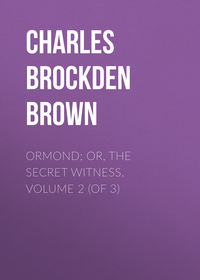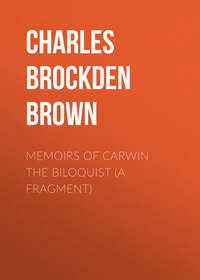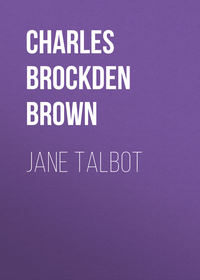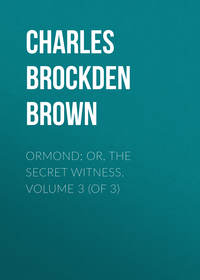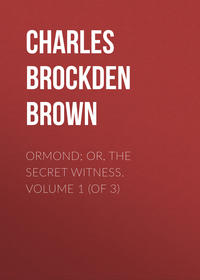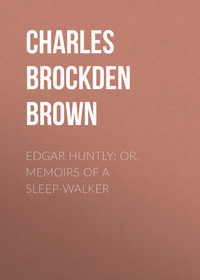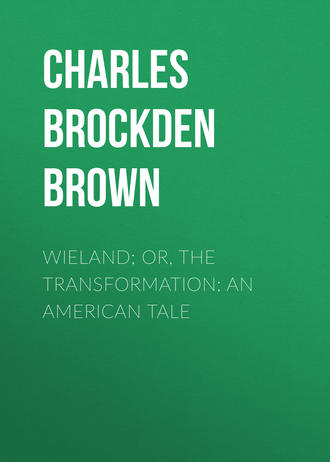 полная версия
полная версияWieland; Or, The Transformation: An American Tale
The journey which he was preparing to take, at the termination of our last interview, the catastrophe of the ensuing night induced him to delay. The motives of this journey I had, till now, totally mistaken. They were explained to me by my uncle, whose tale excited my astonishment without awakening my regret. In a different state of mind, it would have added unspeakably to my distress, but now it was more a source of pleasure than pain. This, perhaps, is not the least extraordinary of the facts contained in this narrative. It will excite less wonder when I add, that my indifference was temporary, and that the lapse of a few days shewed me that my feelings were deadened for a time, rather than finally extinguished.
Theresa de Stolberg was alive. She had conceived the resolution of seeking her lover in America. To conceal her flight, she had caused the report of her death to be propagated. She put herself under the conduct of Bertrand, the faithful servant of Pleyel. The pacquet which the latter received from the hands of his servant, contained the tidings of her safe arrival at Boston, and to meet her there was the purpose of his journey.
This discovery had set this man's character in a new light. I had mistaken the heroism of friendship for the phrenzy of love. He who had gained my affections, may be supposed to have previously entitled himself to my reverence; but the levity which had formerly characterized the behaviour of this man, tended to obscure the greatness of his sentiments. I did not fail to remark, that since this lady was still alive, the voice in the temple which asserted her death, must either have been intended to deceive, or have been itself deceived. The latter supposition was inconsistent with the notion of a spiritual, and the former with that of a benevolent being.
When my disease abated, Pleyel had forborne his visits, and had lately set out upon this journey. This amounted to a proof that my guilt was still believed by him. I was grieved for his errors, but trusted that my vindication would, sooner or later, be made.
Meanwhile, tumultuous thoughts were again set afloat by a proposal made to me by my uncle. He imagined that new airs would restore my languishing constitution, and a varied succession of objects tend to repair the shock which my mind had received. For this end, he proposed to me to take up my abode with him in France or Italy.
At a more prosperous period, this scheme would have pleased for its own sake. Now my heart sickened at the prospect of nature. The world of man was shrowded in misery and blood, and constituted a loathsome spectacle. I willingly closed my eyes in sleep, and regretted that the respite it afforded me was so short. I marked with satisfaction the progress of decay in my frame, and consented to live, merely in the hope that the course of nature would speedily relieve me from the burthen. Nevertheless, as he persisted in his scheme, I concurred in it merely because he was entitled to my gratitude, and because my refusal gave him pain.
No sooner was he informed of my consent, than he told me I must make immediate preparation to embark, as the ship in which he had engaged a passage would be ready to depart in three days. This expedition was unexpected. There was an impatience in his manner when he urged the necessity of dispatch that excited my surprize. When I questioned him as to the cause of this haste, he generally stated reasons which, at that time, I could not deny to be plausible; but which, on the review, appeared insufficient. I suspected that the true motives were concealed, and believed that these motives had some connection with my brother's destiny.
I now recollected that the information respecting Wieland which had, from time to time, been imparted to me, was always accompanied with airs of reserve and mysteriousness. What had appeared sufficiently explicit at the time it was uttered, I now remembered to have been faltering and ambiguous. I was resolved to remove my doubts, by visiting the unfortunate man in his dungeon.
Heretofore the idea of this visit had occurred to me; but the horrors of his dwelling-place, his wild yet placid physiognomy, his neglected locks, the fetters which constrained his limbs, terrible as they were in description, how could I endure to behold!
Now, however, that I was preparing to take an everlasting farewell of my country, now that an ocean was henceforth to separate me from him, how could I part without an interview? I would examine his situation with my own eyes. I would know whether the representations which had been made to me were true. Perhaps the sight of the sister whom he was wont to love with a passion more than fraternal, might have an auspicious influence on his malady.
Having formed this resolution, I waited to communicate it to Mr. Cambridge. I was aware that, without his concurrence, I could not hope to carry it into execution, and could discover no objection to which it was liable. If I had not been deceived as to his condition, no inconvenience could arise from this proceeding. His consent, therefore, would be the test of his sincerity.
I seized this opportunity to state my wishes on this head. My suspicions were confirmed by the manner in which my request affected him. After some pause, in which his countenance betrayed every mark of perplexity, he said to me, "Why would you pay this visit? What useful purpose can it serve?"
"We are preparing," said I, "to leave the country forever: What kind of being should I be to leave behind me a brother in calamity without even a parting interview? Indulge me for three minutes in the sight of him. My heart will be much easier after I have looked at him, and shed a few tears in his presence."
"I believe otherwise. The sight of him would only augment your distress, without contributing, in any degree, to his benefit."
"I know not that," returned I. "Surely the sympathy of his sister, proofs that her tenderness is as lively as ever, must be a source of satisfaction to him. At present he must regard all mankind as his enemies and calumniators. His sister he, probably, conceives to partake in the general infatuation, and to join in the cry of abhorrence that is raised against him. To be undeceived in this respect, to be assured that, however I may impute his conduct to delusion, I still retain all my former affection for his person, and veneration for the purity of his motives, cannot but afford him pleasure. When he hears that I have left the country, without even the ceremonious attention of a visit, what will he think of me? His magnanimity may hinder him from repining, but he will surely consider my behaviour as savage and unfeeling. Indeed, dear Sir, I must pay this visit. To embark with you without paying it, will be impossible. It may be of no service to him, but will enable me to acquit myself of what I cannot but esteem a duty. Besides," continued I, "if it be a mere fit of insanity that has seized him, may not my presence chance to have a salutary influence? The mere sight of me, it is not impossible, may rectify his perceptions."
"Ay," said my uncle, with some eagerness; "it is by no means impossible that your interview may have that effect; and for that reason, beyond all others, would I dissuade you from it."
I expressed my surprize at this declaration. "Is it not to be desired that an error so fatal as this should be rectified?"
"I wonder at your question. Reflect on the consequences of this error. Has he not destroyed the wife whom he loved, the children whom he idolized? What is it that enables him to bear the remembrance, but the belief that he acted as his duty enjoined? Would you rashly bereave him of this belief? Would you restore him to himself, and convince him that he was instigated to this dreadful outrage by a perversion of his organs, or a delusion from hell?
"Now his visions are joyous and elate. He conceives himself to have reached a loftier degree of virtue, than any other human being. The merit of his sacrifice is only enhanced in the eyes of superior beings, by the detestation that pursues him here, and the sufferings to which he is condemned. The belief that even his sister has deserted him, and gone over to his enemies, adds to his sublimity of feelings, and his confidence in divine approbation and future recompense.
"Let him be undeceived in this respect, and what floods of despair and of horror will overwhelm him! Instead of glowing approbation and serene hope, will he not hate and torture himself? Self-violence, or a phrenzy far more savage and destructive than this, may be expected to succeed. I beseech you, therefore, to relinquish this scheme. If you calmly reflect upon it, you will discover that your duty lies in carefully shunning him."
Mr. Cambridge's reasonings suggested views to my understanding, that had not hitherto occurred. I could not but admit their validity, but they shewed, in a new light, the depth of that misfortune in which my brother was plunged. I was silent and irresolute.
Presently, I considered, that whether Wieland was a maniac, a faithful servant of his God, the victim of hellish illusions, or the dupe of human imposture, was by no means certain. In this state of my mind it became me to be silent during the visit that I projected. This visit should be brief: I should be satisfied merely to snatch a look at him. Admitting that a change in his opinions were not to be desired, there was no danger from the conduct which I should pursue, that this change should be wrought.
But I could not conquer my uncle's aversion to this scheme. Yet I persisted, and he found that to make me voluntarily relinquish it, it was necessary to be more explicit than he had hitherto been. He took both my hands, and anxiously examining my countenance as he spoke, "Clara," said he, "this visit must not be paid. We must hasten with the utmost expedition from this shore. It is folly to conceal the truth from you, and, since it is only by disclosing the truth that you can be prevailed upon to lay aside this project, the truth shall be told.
"O my dear girl!" continued he with increasing energy in his accent, "your brother's phrenzy is, indeed, stupendous and frightful. The soul that formerly actuated his frame has disappeared. The same form remains; but the wise and benevolent Wieland is no more. A fury that is rapacious of blood, that lifts his strength almost above that of mortals, that bends all his energies to the destruction of whatever was once dear to him, possesses him wholly.
"You must not enter his dungeon; his eyes will no sooner be fixed upon you, than an exertion of his force will be made. He will shake off his fetters in a moment, and rush upon you. No interposition will then be strong or quick enough to save you.
"The phantom that has urged him to the murder of Catharine and her children is not yet appeased. Your life, and that of Pleyel, are exacted from him by this imaginary being. He is eager to comply with this demand. Twice he has escaped from his prison. The first time, he no sooner found himself at liberty, than he hasted to Pleyel's house. It being midnight, the latter was in bed. Wieland penetrated unobserved to his chamber, and opened his curtain. Happily, Pleyel awoke at the critical moment, and escaped the fury of his kinsman, by leaping from his chamber-window into the court. Happily, he reached the ground without injury. Alarms were given, and after diligent search, your brother was found in a chamber of your house, whither, no doubt, he had sought you. His chains, and the watchfulness of his guards, were redoubled; but again, by some miracle, he restored himself to liberty. He was now incautiously apprized of the place of your abode: and had not information of his escape been instantly given, your death would have been added to the number of his atrocious acts.
"You now see the danger of your project. You must not only forbear to visit him, but if you would save him from the crime of embruing his hands in your blood, you must leave the country. There is no hope that his malady will end but with his life, and no precaution will ensure your safety, but that of placing the ocean between you.
"I confess I came over with an intention to reside among you, but these disasters have changed my views. Your own safety and my happiness require that you should accompany me in my return, and I entreat you to give your cheerful concurrence to this measure."
After these representations from my uncle, it was impossible to retain my purpose. I readily consented to seclude myself from Wieland's presence. I likewise acquiesced in the proposal to go to Europe; not that I ever expected to arrive there, but because, since my principles forbad me to assail my own life, change had some tendency to make supportable the few days which disease should spare to me.
What a tale had thus been unfolded! I was hunted to death, not by one whom my misconduct had exasperated, who was conscious of illicit motives, and who sought his end by circumvention and surprize; but by one who deemed himself commissioned for this act by heaven; who regarded this career of horror as the last refinement of virtue; whose implacability was proportioned to the reverence and love which he felt for me, and who was inaccessible to the fear of punishment and ignominy!
In vain should I endeavour to stay his hand by urging the claims of a sister or friend: these were his only reasons for pursuing my destruction. Had I been a stranger to his blood; had I been the most worthless of human kind; my safety had not been endangered.
Surely, said I, my fate is without example. The phrenzy which is charged upon my brother, must belong to myself. My foe is manacled and guarded; but I derive no security from these restraints. I live not in a community of savages; yet, whether I sit or walk, go into crouds, or hide myself in solitude, my life is marked for a prey to inhuman violence; I am in perpetual danger of perishing; of perishing under the grasp of a brother!
I recollected the omens of this destiny; I remembered the gulf to which my brother's invitation had conducted me; I remembered that, when on the brink of danger, the author of my peril was depicted by my fears in his form: Thus realized, were the creatures of prophetic sleep, and of wakeful terror!
These images were unavoidably connected with that of Carwin. In this paroxysm of distress, my attention fastened on him as the grand deceiver; the author of this black conspiracy; the intelligence that governed in this storm.
Some relief is afforded in the midst of suffering, when its author is discovered or imagined; and an object found on which we may pour out our indignation and our vengeance. I ran over the events that had taken place since the origin of our intercourse with him, and reflected on the tenor of that description which was received from Ludloe. Mixed up with notions of supernatural agency, were the vehement suspicions which I entertained, that Carwin was the enemy whose machinations had destroyed us.
I thirsted for knowledge and for vengeance. I regarded my hasty departure with reluctance, since it would remove me from the means by which this knowledge might be obtained, and this vengeance gratified. This departure was to take place in two days. At the end of two days I was to bid an eternal adieu to my native country. Should I not pay a parting visit to the scene of these disasters? Should I not bedew with my tears the graves of my sister and her children? Should I not explore their desolate habitation, and gather from the sight of its walls and furniture food for my eternal melancholy?
This suggestion was succeeded by a secret shuddering. Some disastrous influence appeared to overhang the scene. How many memorials should I meet with serving to recall the images of those I had lost!
I was tempted to relinquish my design, when it occurred to me that I had left among my papers a journal of transactions in shorthand. I was employed in this manuscript on that night when Pleyel's incautious curiosity tempted him to look over my shoulder. I was then recording my adventure in THE RECESS, an imperfect sight of which led him into such fatal errors.
I had regulated the disposition of all my property. This manuscript, however, which contained the most secret transactions of my life, I was desirous of destroying. For this end I must return to my house, and this I immediately determined to do.
I was not willing to expose myself to opposition from my friends, by mentioning my design; I therefore bespoke the use of Mr. Hallet's chaise, under pretence of enjoying an airing, as the day was remarkably bright.
This request was gladly complied with, and I directed the servant to conduct me to Mettingen. I dismissed him at the gate, intending to use, in returning, a carriage belonging to my brother.
Chapter XXII
The inhabitants of the HUT received me with a mixture of joy and surprize. Their homely welcome, and their artless sympathy, were grateful to my feelings. In the midst of their inquiries, as to my health, they avoided all allusions to the source of my malady. They were honest creatures, and I loved them well. I participated in the tears which they shed when I mentioned to them my speedy departure for Europe, and promised to acquaint them with my welfare during my long absence.
They expressed great surprize when I informed them of my intention to visit my cottage. Alarm and foreboding overspread their features, and they attempted to dissuade me from visiting an house which they firmly believed to be haunted by a thousand ghastly apparitions.
These apprehensions, however, had no power over my conduct. I took an irregular path which led me to my own house. All was vacant and forlorn. A small enclosure, near which the path led, was the burying-ground belonging to the family. This I was obliged to pass. Once I had intended to enter it, and ponder on the emblems and inscriptions which my uncle had caused to be made on the tombs of Catharine and her children; but now my heart faltered as I approached, and I hastened forward, that distance might conceal it from my view.
When I approached the recess, my heart again sunk. I averted my eyes, and left it behind me as quickly as possible. Silence reigned through my habitation, and a darkness which closed doors and shutters produced. Every object was connected with mine or my brother's history. I passed the entry, mounted the stair, and unlocked the door of my chamber. It was with difficulty that I curbed my fancy and smothered my fears. Slight movements and casual sounds were transformed into beckoning shadows and calling shapes.
I proceeded to the closet. I opened and looked round it with fearfulness. All things were in their accustomed order. I sought and found the manuscript where I was used to deposit it. This being secured, there was nothing to detain me; yet I stood and contemplated awhile the furniture and walls of my chamber. I remembered how long this apartment had been a sweet and tranquil asylum; I compared its former state with its present dreariness, and reflected that I now beheld it for the last time.
Here it was that the incomprehensible behaviour of Carwin was witnessed: this the stage on which that enemy of man shewed himself for a moment unmasked. Here the menaces of murder were wafted to my ear; and here these menaces were executed.
These thoughts had a tendency to take from me my self-command. My feeble limbs refused to support me, and I sunk upon a chair. Incoherent and half-articulate exclamations escaped my lips. The name of Carwin was uttered, and eternal woes, woes like that which his malice had entailed upon us, were heaped upon him. I invoked all-seeing heaven to drag to light and to punish this betrayer, and accused its providence for having thus long delayed the retribution that was due to so enormous a guilt.
I have said that the window shutters were closed. A feeble light, however, found entrance through the crevices. A small window illuminated the closet, and the door being closed, a dim ray streamed through the key-hole. A kind of twilight was thus created, sufficient for the purposes of vision; but, at the same time, involving all minuter objects in obscurity.
This darkness suited the colour of my thoughts. I sickened at the remembrance of the past. The prospect of the future excited my loathing. I muttered in a low voice, Why should I live longer? Why should I drag a miserable being? All, for whom I ought to live, have perished. Am I not myself hunted to death?
At that moment, my despair suddenly became vigorous. My nerves were no longer unstrung. My powers, that had long been deadened, were revived. My bosom swelled with a sudden energy, and the conviction darted through my mind, that to end my torments was, at once, practicable and wise.
I knew how to find way to the recesses of life. I could use a lancet with some skill, and could distinguish between vein and artery. By piercing deep into the latter, I should shun the evils which the future had in store for me, and take refuge from my woes in quiet death.
I started on my feet, for my feebleness was gone, and hasted to the closet. A lancet and other small instruments were preserved in a case which I had deposited here. Inattentive as I was to foreign considerations, my ears were still open to any sound of mysterious import that should occur. I thought I heard a step in the entry. My purpose was suspended, and I cast an eager glance at my chamber door, which was open. No one appeared, unless the shadow which I discerned upon the floor, was the outline of a man. If it were, I was authorized to suspect that some one was posted close to the entrance, who possibly had overheard my exclamations.
My teeth chattered, and a wild confusion took place of my momentary calm. Thus it was when a terrific visage had disclosed itself on a former night. Thus it was when the evil destiny of Wieland assumed the lineaments of something human. What horrid apparition was preparing to blast my sight?
Still I listened and gazed. Not long, for the shadow moved; a foot, unshapely and huge, was thrust forward; a form advanced from its concealment, and stalked into the room. It was Carwin! While I had breath I shrieked. While I had power over my muscles, I motioned with my hand that he should vanish. My exertions could not last long; I sunk into a fit.
O that this grateful oblivion had lasted for ever! Too quickly I recovered my senses. The power of distinct vision was no sooner restored to me, than this hateful form again presented itself, and I once more relapsed.
A second time, untoward nature recalled me from the sleep of death. I found myself stretched upon the bed. When I had power to look up, I remembered only that I had cause to fear. My distempered fancy fashioned to itself no distinguishable image. I threw a languid glance round me; once more my eyes lighted upon Carwin.
He was seated on the floor, his back rested against the wall, his knees were drawn up, and his face was buried in his hands. That his station was at some distance, that his attitude was not menacing, that his ominous visage was concealed, may account for my now escaping a shock, violent as those which were past. I withdrew my eyes, but was not again deserted by my senses.
On perceiving that I had recovered my sensibility, he lifted his head. This motion attracted my attention. His countenance was mild, but sorrow and astonishment sat upon his features. I averted my eyes and feebly exclaimed—"O! fly—fly far and for ever!—I cannot behold you and live!"
He did not rise upon his feet, but clasped his hands, and said in a tone of deprecation—"I will fly. I am become a fiend, the sight of whom destroys. Yet tell me my offence! You have linked curses with my name; you ascribe to me a malice monstrous and infernal. I look around; all is loneliness and desert! This house and your brother's are solitary and dismantled! You die away at the sight of me! My fear whispers that some deed of horror has been perpetrated; that I am the undesigning cause."
What language was this? Had he not avowed himself a ravisher? Had not this chamber witnessed his atrocious purposes? I besought him with new vehemence to go.
He lifted his eyes—"Great heaven! what have I done? I think I know the extent of my offences. I have acted, but my actions have possibly effected more than I designed. This fear has brought me back from my retreat. I come to repair the evil of which my rashness was the cause, and to prevent more evil. I come to confess my errors."


